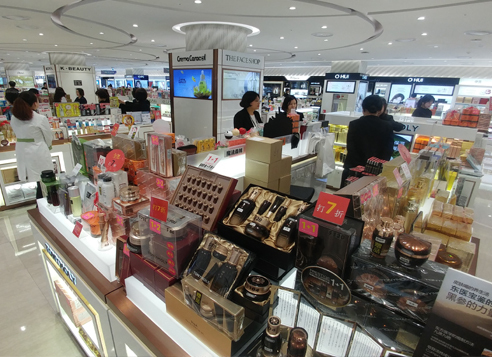Duty-free operators and air carriers in Korea are seeking out ways to increases sales among tourists from countries other than China, as Beijing’s travel ban is expected to cut deep into revenues this year.
Dependency on Chinese consumers has been high in Korea, as indicated by data for February that showed the impact of anticipation of the travel ban.
According to the Korea Duty Free Shops Association, sales at duty-free outlets here hit a record high in February to reach $1.14 billion. The growth was fueled by increased spending by non-Korean shoppers, who spent nearly $200 million more in February than the month before.
Duty-free operators say that much of that spending came from Chinese shoppers who bought large quantities of Korean items ahead of the travel ban, which went into effect on March 15.
The travel ban was one of several measures taken by the Chinese government in retaliation against Korea’s decision to install an US anti-missile defense system here.
 |
Lotte Duty Free in Jeju loses its crowds following China's travel ban (Yonhap) |
“In February, our sales grew by 30 percent on-year, which is rare,” said a spokesman for Lotte Duty Free, the largest operator here.
He said that as tensions grew between the Chinese and Korean governments, Chinese shoppers had noticeably begun to buy in larger quantities.
Chinese shoppers make up 70 percent of Lotte Duty Free’s sales and Lotte saw its sales plummet by 30 percent compared to the same weekend last year during the first weekend after the travel ban went into effect.
Duty-free operators such as Lotte have begun to make efforts to bring in shoppers from other countries to reduce the damage. In particular, companies are looking to bring in shoppers from Japan and Southeast Asia.
Shinsegae DF, for example, signed an agreement Tuesday with Nami Island, one of the major tourist attractions near Seoul, to conduct joint marketing promotions.
The company said that it decided to partner with Nami Island because over half of the foreign visitors to the attraction came from countries other than China, creating a “foundation for attracting tourists from a variety of countries.”
Air carriers are also looking to Southeast Asia and Japan, major short-haul destinations, to replace the demand from China. After the travel ban went into effect, full-service carriers Korean Air and Asiana Airlines put a portion of their China-bound flights on hold until the end of April due to low sales.
A spokesman for Korean Air said that the carrier was making efforts to “strengthen sales” in those targeted areas by increasing promotional events.
Incheon International Airport Corp. has joined in the efforts as well, waiving airport fees for three years for new airlines in the Japan and Southeast Asia areas that newly began servicing Incheon. The company said Tuesday that 14 airlines in the target regions expressed interest in newly servicing or increasing flights to Incheon within the year.
Between March 16 and Tuesday, the airport saw 40,000 fewer passengers using the airport for China-bound flights compared to the same week last year.
By Won Ho-jung (
hjwon@heraldcorp.com)








![[Today’s K-pop] Blackpink’s Jennie, Lisa invited to Coachella as solo acts](http://res.heraldm.com/phpwas/restmb_idxmake.php?idx=644&simg=/content/image/2024/11/21/20241121050099_0.jpg)